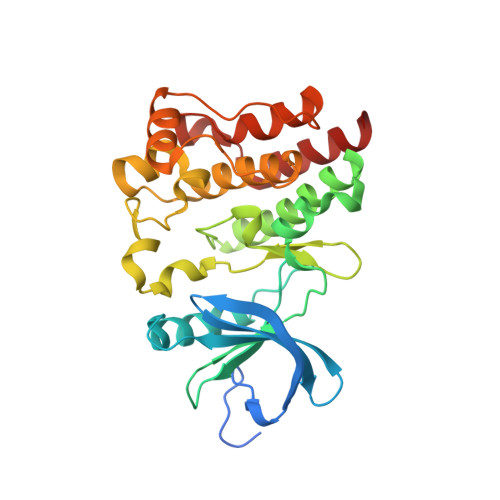The BTK Inhibitor ARQ 531 Targets Ibrutinib-Resistant CLL and Richter Transformation.
Reiff, S.D., Mantel, R., Smith, L.L., Greene, J.T., Muhowski, E.M., Fabian, C.A., Goettl, V.M., Tran, M., Harrington, B.K., Rogers, K.A., Awan, F.T., Maddocks, K., Andritsos, L., Lehman, A.M., Sampath, D., Lapalombella, R., Eathiraj, S., Abbadessa, G., Schwartz, B., Johnson, A.J., Byrd, J.C., Woyach, J.A.(2018) Cancer Discov 8: 1300-1315
- PubMed: 30093506
- DOI: https://doi.org/10.1158/2159-8290.CD-17-1409
- Primary Citation of Related Structures:
6E4F - PubMed Abstract:
Targeted inhibition of Bruton tyrosine kinase (BTK) with the irreversible inhibitor ibrutinib has improved outcomes for patients with hematologic malignancies, including chronic lymphocytic leukemia (CLL). Here, we describe preclinical investigations of ARQ 531, a potent, reversible inhibitor of BTK with additional activity against Src family kinases and kinases related to ERK signaling. We hypothesized that targeting additional kinases would improve global inhibition of signaling pathways, producing more robust responses. In vitro treatment of patient CLL cells with ARQ 531 decreases BTK-mediated functions including B-cell receptor (BCR) signaling, viability, migration, CD40 and CD86 expression, and NF-κB gene transcription. In vivo , ARQ 531 was found to increase survival over ibrutinib in a murine Eμ-TCL1 engraftment model of CLL and a murine Eμ-MYC/TCL1 engraftment model resembling Richter transformation. Additionally, ARQ 531 inhibits CLL cell survival and suppresses BCR-mediated activation of C481S BTK and PLCγ2 mutants, which facilitate clinical resistance to ibrutinib. Significance: This study characterizes a rationally designed kinase inhibitor with efficacy in models recapitulating the most common mechanisms of acquired resistance to ibrutinib. Reversible BTK inhibition is a promising strategy to combat progressive CLL, and multikinase inhibition demonstrates superior efficacy to targeted ibrutinib therapy in the setting of Richter transformation. Cancer Discov; 8(10); 1300-15. ©2018 AACR. This article is highlighted in the In This Issue feature, p. 1195 .
Organizational Affiliation:
Department of Internal Medicine, Division of Hematology, Comprehensive Cancer Center, The Ohio State University, Columbus, Ohio.





















